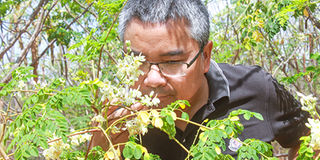Premium
Moringa oleifera, a super food and medicinal tree

A moringa oleifera farmer in Makueni. According to research, moringa leaves have 25 times more iron than spinach, 10 times more vitamin A than carrots, seven times more vitamin C than oranges and 17 times more calcium than milk. PHOTO | FILE | NATION MEDIA GROUP
What you need to know:
- Its main commercial value is food and medicine. Indeed, it is described as the most nutritious terrestrial plant in the world.
- It needs altitudes ranging from 0 to 2,000 metres above sea level and annual rains from less than 400mm to more than 1,400mm.
- It works with the Kenya Forest Service, which provides extension services, and Kefri, which supplies seeds and seedlings.
- They are ground into a paste that is then poured into untreated water and given time to trap the impurities before settling at the bottom.
I have first-hand experience growing all the trees I have written about in this column. So when Ndunda Makanga, an agronomist from Makueni and an ardent reader of the column, asked me to write about moringa oleifera a few weeks ago, I took the challenge.
I researched more on the tree and learnt a lot and I wonder why I have never planted it. Simply known as moringa, this tree is native to the foothills of the Himalayan mountains in northern India.
Its main commercial value is food and medicine. Indeed, it is described as the most nutritious terrestrial plant in the world.
It is fast-growing, drought-resistant, and can reach heights of 12 metres at maturity and a lifespan of up to 20 years.
The Guide to Tree Planting in Kenya, a publication of the Kenya Forestry Research Institute (Kefri), says it is grown in a wide range of ecological zones, from the Coast to the central highlands, north-eastern, eastern, Rift Valley and western Kenya.
It needs altitudes ranging from 0 to 2,000 metres above sea level and annual rains from less than 400mm to more than 1,400mm.
A number of organisations are supporting farmers to grow it in Kenya as part of food security and poverty-eradication efforts.
They include the International Tree Foundation, a UK-registered non-governmental organisation, whose project is in Kakamega.
It works with the Kenya Forest Service, which provides extension services, and Kefri, which supplies seeds and seedlings.
A Nairobi-based value addition company has a network of hundreds of farmers in Kenya who grow the tree. It has semi-processing centres in Mombasa, Meru and Embu.
Moringa products, which include beauty, dietary supplements and various blends of teas, are supplied to supermarkets and distributors in and outside the country.
Each part of the tree — leaves, flowers, roots and seeds — has its own benefits, according to the World Agroforestry Centre.
SOLVE PRACTICAL PROBLEMS
In some regions, seed pods are eaten, while in others, leaves are the most commonly used part of the plant. Seeds are also used for water purification.
They are ground into a paste that is then poured into untreated water and given time to trap the impurities before settling at the bottom. The clean water at the top is then decanted for use.
Once the crushed seeds are added to water, they have a magnetic force that attracts dirt particles, including disease-causing organisms.
Officials of the Ministry of Health say that the purified water produces between 90 and 99 per cent reduction in bacteria. Conventional water purifiers contain aluminium salt as the active ingredient. The natural coagulant in moringa seeds acts the same way as the aluminium salt in trapping dirt and killing bacteria.
Joint research by the University of Botswana and Uppsala University in Sweden successfully removed impurities from water using moringa seeds.
Researchers have hailed the method as the ultimate answer to millions in the world who struggle with access to clean water.
“It’s amazing to see that simple interactions between molecules can solve practical problems. Understanding this process can lead to further developments in water purification using naturally occurring and environmentally friendly materials,” said Adrian Rennie, one of the researchers in the project and a professor of Neutron Scattering at Uppsala University.
According to research, moringa leaves have 25 times more iron than spinach, 10 times more vitamin A than carrots, seven times more vitamin C than oranges and 17 times more calcium than milk.
In ancient Thailand, moringa medicine has been used for generations to treat and prevent diseases such as hypertension, diabetes, heart disease, anaemia, arthritis, liver disease and respiratory, skin, and digestive disorders.
Moringa seeds are rich in zinc and calcium, which keep bones and teeth strong.
It can be propagated from cuttings but the seed method is the best as it gives stronger, healthier trees.
Seeds sell for Sh1,500 a kilo at Kefri. They should be soaked in water for 24 hours to soften the husks and once sowed, they germinate in five to 10 days and can be planted at a foot tall. In most private nurseries, seedlings cost between Sh50 and Sh100, depending on their age.




